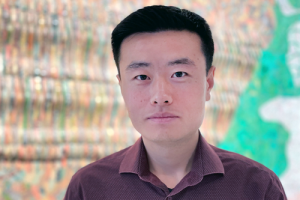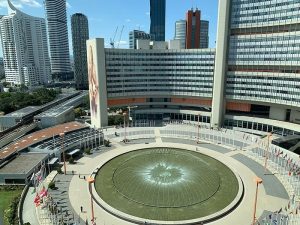Powering Toward a Brighter Future with the Help of AI
Published November 1, 2024
Jiaqun Wang, a 27-year-old student at Johns Hopkins University, hopes to put his MS in Energy Policy and Climate degree to good use on a global stage following his May 2025 graduation.

Originally from China and now residing in Washington, D.C., Wang credits undergraduate projects with wind turbines, solar panels, and battery systems for igniting his passion for the energy field. He now has set his sights on revolutionizing the electricity sector through a blend of artificial intelligence and renewable energy.
“These projects sparked my interest in renewable energy development,” Wang said. “I realized that while we have many technology options for energy transition, most of them haven’t been deployed at scale yet. That’s what pushed me toward exploring energy policy and economics.”
As a research assistant in the energy policy field, Wang gained valuable insights into electricity markets and energy economics. His work soon intersected with AI, leading him to research how machine learning can enhance market efficiency.
“I started thinking about how to apply machine learning to electricity markets to improve their efficiency,” he said.
Wang’s goal is to start a company that will apply AI solutions to promote renewable energy and electricity storage resources.
In pursuit of this goal, Wang chose Johns Hopkins University Advanced Academic Programs, where he says the Energy Policy and Climate program offers “exposure to policy, economics, and the technologies of energy.” The university’s startup resources and renowned high-performance computing resources were also selling points for enrollment.

This past summer, Wang interned at the United Nations Industrial Development Organization headquarters in Vienna, Austria. Working in the Decarbonization and Sustainable Energy Division, he supported the Climate Technologies Innovation Unit by developing data visualization tools for climate and energy enterprises.
The internship, Wang said, was “a life treasure,” where he gained firsthand knowledge about small modular nuclear plants, small-scale hydropower, green hydrogen, and climate finance.
“The experience really pushed me out of my technology comfort zone and taught me how to communicate and collaborate with people from different backgrounds,” he said.
The internship also brought Wang’s dream of creating a startup, that will leverage AI to improve renewable energy penetration in the electricity market, into focus.
“Right now, the operation of (energy) storage is not very effective, but I believe that with AI technology’s help, storage can be operated more efficiently with renewable energy,” he said.
Wang is now using his fall selection to the Pava Marie LaPere Center for Entrepreneurship, and his membership in Johns Hopkins Technology Ventures’ Startup Accelerator program, to bring his AI solutions for the electricity sector to life.
For Wang, the vision is clear, and the future is bright.
“I seek a meaningful and immortal life where I can change the world through my creations,” he said.
Attention: Students and Alumni
Are you a current AAP student or alumni and want to share your accomplishments?
Interested in pursuing a graduate degree at Johns Hopkins University?
Request information to learn more or apply here.